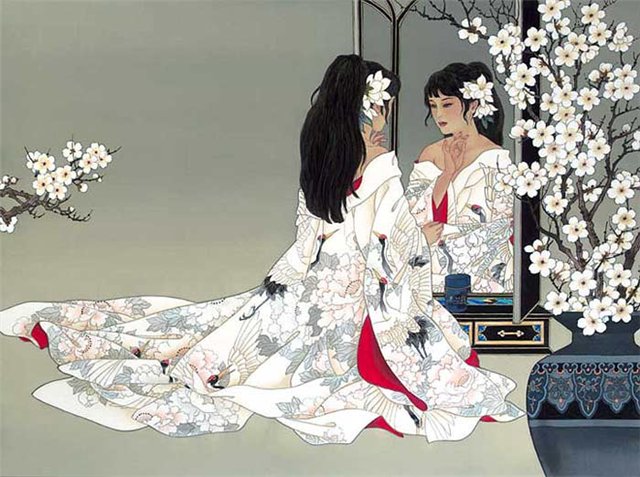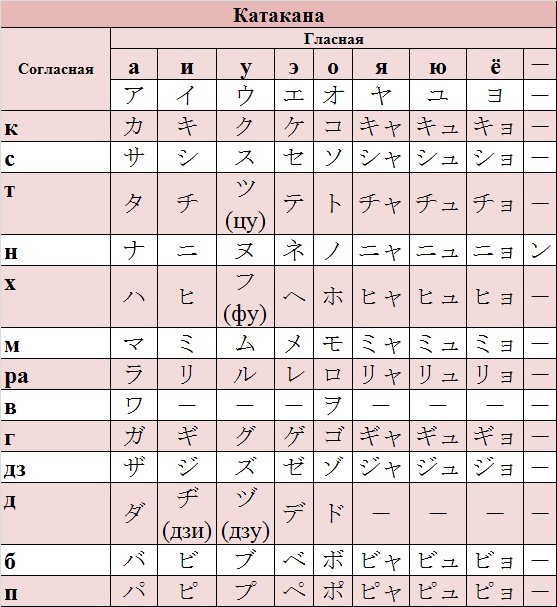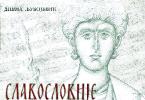In modern japanese There are two sludge alphabets: Haragan and Catakana.
Japanese alphabet of Hiragana
Haragan is usually used in combination with hieroglyphs, where prefixes, suffixes and other grammatical elements, all sorts of particles, etc. are denoted. You can simply write a Japanese word on this alphabet in various situations. For example, some words are taken to write on this alphabet, and not by hieroglyphs, or as a transcription of hieroglyphs, etc.
The expression is very vulgar, so the correct translation in Italian will "take us to the ass!" But for the reasons that we all know, it was very cute, and in some cases even translated completely differently. Even the "Yaro", repeating several times throughout the history, is a vulgar expression, and the literal translation is "bastard!". Obviously, he wants to translate it with other vulgar terms, but this is the original value. This first is also heard for the first time along with the expression when the minions of the zeta attack the Ken.
For example, the expression of a "pleasant appetite" on the Japanese alphabet of Haragan is written as follows:  and pronounced ITADakimas
and pronounced ITADakimas
And this means on Japanese "Sorry" ![]() And read as "Sumimasan".
And read as "Sumimasan".
This is not by chance, but this episode is a bit compilation of the most frequently used arrogant phrases, which will then be added to it. Verb literally "murder" and made with a very strong and cruel expression. Terms in brackets are often expressed and are prefixes and particles that make focus on the main concept. So often you will hear the "Korshitu Yar", which is the main form. The form of "buckthorn" is much more severe; About "murder with extreme forces and violence" or something like that.
In fact, this initial "bu", which will be "Butsu", literally "beat, hit." Sometimes also in the "Buchi" option, as in the "Buchi-Korošite Yar!". Everything, in the face of social discrimination. Simple imperative, nothing more or less. The vowel in parentheses is only an extended form that reproduces a kind of cry, since it adds more vocals in Italian. In fact, the enemies of Ken are called this "bakemon" phrase - Bakemon yes! Where "or" the vocals often falls. His exceptional abilities suggested.
Japanese alphabet Katakana
Katakana is used to record foreign words, names, names and other things. Also, this alphabet is sometimes used to record Japanese words as italics to highlight the word.

As you might notice in Japanese, there are no some letters. Therefore, to record words with missing letters, the closest to sound are used. For example, C \u003d w \u003d u, B \u003d b, s \u003d dz, l \u003d p, f \u003d x, etc. Also, except the letter N in the Japanese alphabet there are no consonants not included in the syllables. They are replaced with a syllable with the letter y, and since the syllables of that and do not, then they are applied to.
On the contrary, this word is used to determine the individual in the negative, monster anger or cruelty. Ken, for example, uses him, turning to the man of paintings before meeting him, saying: "Oh, Bakrevo" or "Hey, Monster." This term "oh" is a gross correspondent of our "Hey" to attract attention. Also because Ken could not fully appeal to this Kuste man.
Previously, it was used as a term of respect to indicate the second person or "you." However, on modern language It has a completely opposite sense, that is, vulgar. He always points out "you", but he transmits a sense of threat, aggression and vulgarity. Often it is used as "you", as indicated above, in the phrase, and sometimes instead, as in the example in red, is used for exclamation. Depending on the context, it can also be translated with a keyword. The most suitable term "cursed" when used as an exclamation, but the meaning is always like.
As an example, we will analyze how to write a name Maxim on Japanese: マクシーム
Ma \u003d マ, k \u003d ku \u003d ク, si \u003d シ, ー - sign of accepted, m \u003d mu \u003d ム and it turns out "Makusima"
The following example will write the name Victoria on Japanese: ビクトーリヤ
vi \u003d bi \u003d ビ, k \u003d ク, then \u003d ト, ー - the sign of the accent, Ri \u003d リ, I \u003d ヤ \u003d bikuoy
However, in the 20th century, foreign words became increasingly and more used and the Japanese alphabet of Katakana was supplemented.
It is even saying that even this word, given the frequent spells, which go and go out of history, is used a bit of all, especially from coarse guys, as well as the most strong warriors and Ken himself, who, anger loses its typical Japanese applub and is produced in various bright expressions. Sometimes the word in parentheses is sometimes pronounced; This only adds more attention. In fact, the "tank" in Japanese means "stupid, stupid, absurd, illogical, excessively, etc.". Often the enemies of the Ken, an example of many pretty painters, use this surprised expression that their technique does not work or is not amazed by the force, skill and adversary technique.

Now you can write the name Victoria not as a bikoute, but with new signs of Vicutory - ヴィクトーリヤ
And the name of Zina on Japanese is so ズィーナ, and not Dzin, as it was recorded earlier. ジーナ
You can write a name using any option, but the second more modern and better transmits a foreign name / word recording. By the way, it is used when transferring names on this site.
He almost always utters minor characters, which reminds a little when it comes to popularity and characteristic that distinguishes it. In Italian, these two expressions are used without parsing and especially in the first part of the first series, although, perhaps the first of them are a little more common - they were translated by inserting the words "stars". The feeling does not change much, perhaps it is also more poetic and mystically, but in fact it is just "scars". Tire also deserves success, not wanting to create nicknames of Ken with his shrill fingers.
If you want to learn the Japanese alphabet, then the most effective is to read the texts on Japanese alphabets. It is still very good to learn Japanese alvafit on songs:
Song for memorization japanese alphabet hiragana
Song for memorizing the Japanese ABC Catakana
Japanese language It is absolutely not similar to the languages \u200b\u200bof Slavic or Latin origin, so seeing the first hieroglyphs for the first time, you can immediately be confused, because absolutely nothing is clear! But, if you figure it out a little, there is nothing difficult. We bring to your attention the Japanese alphabet with translation into Russian. You yourself make sure that each symbol has a Russian analog of letters. Mysterious symbols that can only prone Japanese will not be ;-). Therefore, boldly go and study the Japanese alphabet!
The reason is that this is an author's invention, a kind of typical exclamation, which is pronounced shortly before the outbreak occurred due to the pressure of Kenshiro secret points. He appears for the first time in the manga. The heart to scream Hidbu! The moment in front of the explosion. Listen, and you will not regret. The first means "terrible, terrible, crazy"; The second is "fat, oily, swollen." Their creation would have turned out from "Hidba", which would translate, wanting to force it, would be a kind of "what a terrible tumor!", And then burst.
There are so many expressions of this type that characterize the moment of bursts of the body and are known in Japan among fans. Among other things, the Japanese love to give name anything, even shouting from pain. It is very similar to my hypothesis, but in a different way. "Hide" is the same as "ITI" that for "I hurt you, this pain" - the expression that Mr. Heart uses when he sees his blood, and "bu" is an expressive medicine that Indicates swelling.
Language learning begins with studying the alphabet. In Japanese, all letters have a similar pronunciation with the Russian language, and it is a big plus for Japanese studying! For a Russian-speaking person, the Japanese is not working in Japanese, because In Japanese, there are all the same sounds as in Russian. That's just there is such a feature, in Japanese language is not one alphabet, but two. it haragan and Katakana. They have some differences and are used in various cases. Where and how used japanese alphabet (by Japanese "Kana") We will try to figure out now.
Boom! There will be a phrase, paraphrasing it. Translation: Hey! Try to say my name! Any passionate Hokuto Ken does not recognize this exquisite and good expression. This is he, Tamar for the benefit! Jagger, in the Italian version; Yagi in the Japanese version. It remains a real myth and, despite all these words of sympathetic contempt for it, we all have a deep attachment to its very difficult existence and its grotesque sense of humor.
This is his proposal that everyone knows, and there is no need to add anything else. This phrase is considered "typical" even among the Japanese and the one that the most describes this character. Obviously, more ingenious, this is a geniology and a Japanese voice, among other things, gives an ideal idea of \u200b\u200bhow this person is.
Alphabet Hiragana
Japanese alphabetAs we have already found out, has two varieties, one of which is Haragan. It is used to designate some prefixes, suffixes or particles. Of course, you can write a word on Japanese using Hiragana (so often children or studying Japanese, if they do not know how the word is written by a hieroglyph or a hieroglyph too complicated). Some words even be written solely with this alphabet. It is from the study of this alphabet that the Japanese learning begins. So, consider the Japanese alphabet giragana with translation into Russian.
It would be possible to say, a moment before climbing the skies as the illuminated soul. In this beautiful phrase, all life, ambitions and pride of this great warrior series are thickened. Among other things, it is made on a typical classical language, very grateful literary style, which remembers how Samurai said in historical novels. This corresponds to the perfection of Rau and his incredible charisma.
Naturally, our hero has already turned on the secret point switch at the time, so the pact is not preserved. Pay them to the same coin. "Eye to eyes, tooth tooth." The clock is Ikashiteoku it's Omowa! Translation: notorious as you! You really think he can let you live! It is perverted, tough, literally, "far from the direct path." In this context, it is used to determine very sad famous manwho has no principle. In fact, the pronunciation of Fox, known as the puppet of Jackal, in the part that sees it the main character.
|
Hiragana |
|||||||||
|
Consonant |
|||||||||
|
e. In any case, it is too famous to be lowered in this list, which focuses on the cartoon, and partly on the manga. In the animated series, if it existed, it should be in the episode 12, when she kills some residents with the help of special equipment, and soon after that, on the head of the wall sitting opposite the wall, perhaps the dead, pronounces this proposal. Translation: Nuu! And the king of the fist will never fall on his knees! This is the phrase of the famous Rau and very beautiful and linguistic, so it is so well known. This reflects the justice of character. All this is on a very literary language, which remembers the samurai or warrior, typical of this mythical character. Kenshiro speaks about it with the subtlety of sufficiency, as if she underestimated tires, which, obviously, fucked. It is also a very well-known expression and can be used if the Japanese speak with you with this tone of sufficiency. It is heard in the episode in which Lin is almost forced to climb to the inflamed platform and in the last moment saved by Nanto man. |
about |
i |
yu |
e. The Rey sees that Lin is crying, almost fainting and angry with Rugan to kill those villains that have shown it so much. And use this phrase that in Italian would fit "in your veins does not flow blood!". In Japanese, a more "colorful" way to say the same thing very much. I will not have any thoughts! This phrase is very famous in Japan among fans, just because it is very specific in the verbs used. The sauer must say this before the tallest confrontation with Kenshiro, when, already realizing that the struggle came to the end caused by her great pride, she joins the last desperate attack. Translation as always literally, but it can be done in different ways, for example: I will not retreat! Creating this method is definitely more crawling and a little more agile and intensively. |
— |
||||
|
あ |
い |
う By the way, the last verb is also understood as "not repent of anything", so rethinking in this particular value. This is really one of the most beautiful and endless expressions of the whole story. This is a phrase that Rau said during the last collision with Kenshiro, showing that he recognized the Musutensey himself. She intends to say that its only reason for life is the struggle with his brother. As usual, a very strong and intense phrase. Early it is to you! Translation: One day defeated, hit straight! And this is a fair rule! Sergeant crazy, of course, not a lover in the world and fraternity, indeed, on this scene he makes the boy who has just won his brother on a knife training to kill him to death. The boy looks indecisive, and the sergeant helps him, pushing his hand holding a knife in a trunk of a defeated defeated. This, naturally, causes the injury of this poor man who deleted his brother's life with her own hands, according to evil, dictates, actually, "Rules" of a crazy sergeant. |
え |
お |
ゃ |
ゅ The punishment, which causes Kenshiro at least this time, is widespread and deserves. Also very expressively in terms of. Yuda technology is one of the most beautiful and the fact that it can boast of his beauty that is precisely translated into his beautiful technique with red blood light, he only does to feed his myth and keep the intact of his charm, as he would like him. The character does not need presentations, it was nothing but it was one of the few who put Rau in serious problem. The phrase is very beautiful not only because it is poetic and reminds simple and immediate concept, but first of all because it perfectly reflects the character in question: free, carefree, capricious, frustrating. He reflects this until it discovers that the meaning of his life is more important than scratching yawnedly under a beautiful blue sky, whose clouds change the form, like his ideas. |
ょ |
||
|
to |
か |
き |
く |
け |
こ |
きゃ |
きゅ |
きょ |
|
|
from |
|||||||||
|
t. |
た | ち | つ | て | と | ちゃ | ちゅ | ちょ | |
|
n. |
な | に | ぬ | ね | の | にゃ | にゅ | にょ | ん |
|
h. |
は | ひ | ふ | へ | ほ | ひゃ | ひゅ | ひょ | |
|
m. |
ま | み | む | め | も | み | みゅ | みょ | |
|
r. |
ら | り | る | れ | ろ | りゃ | りゅ | りょ | |
|
in |
わ | ー | — | ー | を (wines) | — | — | — | |
|
g. |
が | ぎ | ぐ | げ | ご | ぎゃ | ぎゅ | ぎょ | |
|
dZ |
ざ | じ | ず | ぜ | ぞ | じゃ | じゅ | じょ | |
|
d. |
だ | ぢ | づ | で | ど | ぢゃ | ぢゅ | ぢょ | |
|
b. |
ば | び | ぶ | べ | ぼ | びゃ | びゅ | びょ | |
|
p |
ぱ | ぴ | ぷ | ぺ | ぽ | ぴゃ | ぴゅ | ぴょ | |
As you notice, Japanese has another significant difference. He is Sillabic, that is, consists not from letters and sounds, as we used to, but from slogs. Suppose the word "sieve" for us has 4 characters (both letters and sounds). For the Japanese it would be 2 characters, si. Let us give an example of a couple of Japanese words, with pronunciation in Russian.
すみ ま せ ん - translated as "Sorry". For pronunciation, it will sound as follows: "Sumimasan". By the way, this word is often pronounced "Sumimase:" in conversational speech, which is wrong from the point of view of the language, but, nevertheless, enters Japanese conversational speech (This is like the word "hello" instead of "Hello"). Very much reminds the multiplication table, only here we are looking for the necessary consonant and vowels, and as a result we get the necessary sign of the Haragan.
And let's see one example in transcription. The word "Sakura" on Japanese is written as follows 桜 and has a transcription [さく ら], that is, three syllables sakura Have three characters. Well, the translation, as everyone has already guessed, - cherry.
Japanese alphabet - Catakana
Japanese, of course, is not isolated. It has many borrowed words, and such words are adjacent to the Japanese phonetics. Catakana is just used to record such foreign words. It is also used to highlight some word. This is like our cursive. Catakana has other scope of application that I speak in my catakana if you want to learn this alphabet, then you can
Here's what the Japanese alphabet looks like transferring to Russian Catakana.

But in the 20th century katakana was supplementedSince lacked some letters, for example, "B". This was done so that foreign words could be transmitted most clearly. Now the catakana looks like this:

Although Katakana was supplemented, some words are read on the Japanese manner. If you notice, most Japanese words have open syllable, and borrowed words may have a closed syllable. Then, if there are consonants, it will end on "y" every consonant, which has no vowel (except "n"). For example, the word "gram". In Japanese, it will read and write as a gu-ray, and writing will look like this.
 There are words where there are long vowels. In such cases, immediately after the word is written horizontal or vertical feature (depending on the writing method). For example, the English word CAR. We know that the last letter is not read, but the letter "A" is lengthened. On Japanese it will also be read, as in English, but looks like this. Doubted consonants are transferred in a Japanese letter using the "CSU" sign. This sign is put before the sign, the consonants of which you want to double. In this case, the "CSU" sign will be written less than the other signs, this is done in order to be clear that this is not a sign "CSU", but a doubling sign by consonant. For example, Odessa is read as O-DE-C-SA, but looks like this: オデッサ. It is also possible if, for example, english word Ends on "D", "T", "G" and "P". For example, "Up" is pronounced as A-P-PU, and is written アップ.
There are words where there are long vowels. In such cases, immediately after the word is written horizontal or vertical feature (depending on the writing method). For example, the English word CAR. We know that the last letter is not read, but the letter "A" is lengthened. On Japanese it will also be read, as in English, but looks like this. Doubted consonants are transferred in a Japanese letter using the "CSU" sign. This sign is put before the sign, the consonants of which you want to double. In this case, the "CSU" sign will be written less than the other signs, this is done in order to be clear that this is not a sign "CSU", but a doubling sign by consonant. For example, Odessa is read as O-DE-C-SA, but looks like this: オデッサ. It is also possible if, for example, english word Ends on "D", "T", "G" and "P". For example, "Up" is pronounced as A-P-PU, and is written アップ.
Also, if you paid attention, in Japanese No letter "L". It is transmitted to the syllables of "RA", "RI", "RU", "RE", "RO", depending on the situation. For example, the word "bolt" and will be read as "Bo-Ru something." Most likely, it seems more on the "gross" than on the bolt :-). And some foreign words have found sustainable abbreviations. For example, energy is "e-na" or "program" - "Pu-RO". Therefore, such nuances are very important to know to understand what we are talking about. Stay with us, and you can learn much more.
Japanese alphabet with translation into Russian Significantly simplify learning language. On our site you can find the Japanese alphabet - Haragan and Katakana, as well as a lot of interesting things!
Want to learn Haragan in just a week? Do you think it is impossible? But I'm telling you seriously? After a week you will begin to read and write on the Haragan. Do not believe? .




